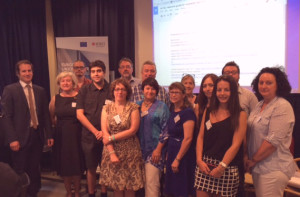The EU Centres across Australia come together on a regular basis to conduct joint activities that promote the EU Centre initiative: A core objective is to give impetus to European Studies and to raise awareness of the EU.
One annual joint activity of the EU Centres is the European Studies Summer School for Secondary Teachers.
The 2016 Summer School was hosted by RMIT University at the Immigration Museum in Melbourne from 19-21 January with the title: “The European Union in Deep Water: Identity, Migration and Opportunity”. The Summer School offered a unique opportunity for teachers to engage with expert speakers on topics that complement secondary school curricula.
The EU Centre for Global Affairs at the University of Adelaide sponsored the participation of 12 secondary school teachers, from both Adelaide and regional South Australia. The 12 travel grant recipients worked in the disciplines of History, Social and Cultural Studies, Geography, Women’s Studies, English, English as an Additional Language, Humanities, Society and Culture, Business and Enterprise, European Languages, German, and Theory of Knowledge.
There were three days of lively discussion with workshops focusing on three themes: The EU Context in 2016; Migration and identity in Europe; and Opportunities for the EU, Australia and New Zealand.
The opening address was delivered by Dr Bruno Scholl, Political Counsellor, EU Delegation in Canberra, on “The EU in deep water: opportunities and challenges”.
Ms Heidi Kneebone, a teacher of German and Theory of Knowledge, from Concordia College in Adelaide offered her experience of attending the Summer School as follows:
“The themes of this year’s EU Summer School for Secondary Teachers, Migration, Identity and Opportunity provided rich opportunities to learn more on topics from the current mass movements of people, to cultural commemoration and memory work to the negotiation of FTAs.
Presentations and discussion with experts in their fields including embassy representatives from a number of EU member states, gave rare insights into processes of political, economic and cultural integration beyond sensational media coverage, and much material for lively discussion with colleagues in the breaks – from the EU frontline challenges of regulation and service provision for refugees, to EU governance, national sovereignty and ‘Brexit’.
As a secondary language teacher the session on Framing the Curriculum on the European Union conducted by Antonia Mochan from the European Commission was entertaining and useful, with a wealth of practical resource tips and an emphasis on the core commitment of the EU to being ‘united in diversity,’ as expressed in its institutional support for multilingualism and intercultural education. In all these areas we were able to reflect on the Australian context and current and historical responses to migration and integration, aided by the wonderful Jan Molloy (Senior Education Consultant, Immigration Museum, Melbourne) and the work of the Immigration Museum.
All in all, a fantastic way to learn, network and enrich our teaching with up to the minute material and ideas”.
Travel Grants 2017
A call for applications for travel grants for the 2017 European Studies Summer School for Secondary Teachers will be announced in October 2016.

